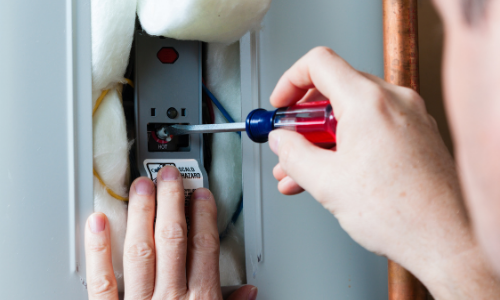What are your thoughts and feelings about Common Hot Water Heater Problems?

A water heater is among one of the most vital standard devices that can be located in a residence. With hot water heater, you do not require to undergo the anxiety of home heating water manually each time there is a need to wash, do the laundry, or the meals. Nevertheless, there is always an opportunity that your water heater would certainly act up as with the majority of mechanical devices.
It is necessary to keep in mind any kind of little malfunction and tackle it rapidly before things get out of hand. Most times, your hot water heater begins to malfunction when there is a build-up of sediments as a result of constant use. As a safety measure, periodic flushing of your hot water heater is advised to prevent sediment accumulation and stop practical failure.
Common hot water heater emergency situations and also exactly how to deal with them
Inadequate hot water
It might be that the water heating unit can't support the hot water demand for your apartment. You might upgrade your water heating unit to one with a larger capacity.
Rising and fall water temperature.
Your water heating system can start producing water of different temperatures normally ice hot or chilly hot. There may be a need to change either the home heating or the thermostat unit of your water heater.
Leaky water heater container.
In this scenario, you need to transform off your water heating unit, permit it to cool down, and also meticulously look for the resource of the issue. At times, all you need to do is to tighten a couple of screws or pipeline links in cases of small leakages. If this does not function and also the leak continues, you could require to employ the solutions of a service technician for an ideal replacement.
Blemished or stinky water
When this happens, you need to recognize if the problem is from the storage tank or the water source. If there is no amusing odor when you run cool water, then you are specific that it is your water heating system that is malfunctioning. The smelly water can be created by rust or the build-up of microorganisms or sediments in the water heating unit container.
Conclusion
Some property owners overlook little caution and also minor faults in their hot water heater unit. This only brings about further damage and a feasible complete breakdown of your device. You should manage your water heater faults as soon as they come near prevent more expenses and also unnecessary emergency problems.
With water heaters, you don't require to go with the tension of heating water manually every time there is a need to take a bath, do the laundry, or the dishes. It might be that the water heating unit can't sustain the hot water demand for your house. Your water heating unit can begin creating water of various temperatures typically ice cool or scalding warm. If there is no amusing scent when you run cold water, after that you are specific that it is your water heater that is damaged. The smelly water can be caused by rust or the buildup of bacteria or sediments in the water heating unit tank.
What’s Wrong With My Water Heater?
Not Enough Hot Water
You probably encounter this problem in the shower or while washing dishes. As you run your water, you’ll notice it starting to cool down. Turning up the hot faucet may not work, or it may only heat the water for a short period. Your hot water probably comes back and works normally one or two hours after you use it up.
If you’ve never had enough hot water, your heater may be too small for your home. If you haven’t had a problem until recently, there’s probably something’s wrong with your heater’s thermostat. Try adjusting it to see if you can feel a difference. Even if the thermostat’s working, the heating element itself could have burnt out. It’s also possible that a clog has restricted water flow into or out of the heater. Luckily, none of these problems are hard to fix, as long as you call them in early.
Water is Too Hot
Unregulated water heaters can make water dangerously hot. You probably have this problem if you’ve been scalded by your hot water. It’s also a likely culprit if you have trouble getting your faucets to produce a comfortable temperature. This problem is easy to fix, but it can also be a serious health hazard if you don’t address it. If you think your water is too hot, don’t doubt yourself; look into it!
Start by finding your heater’s thermostat and mark its position with a pen. Turn the thermostat to a cooler setting. Wait a couple hours to see if the problem is solved. If it isn’t, listen for boiling in the tank and look for water that comes out of the faucet steaming. In those cases, your temperature-pressure relief valve may be malfunctioning. This is a serious problem that can be dangerous, so you should have it looked at right away.
Discolored or Smelly Water
If all your water looks rusty or smells weird, there’s probably a problem with your pipes. If only your hot water looks weird, however, your water heater is probably at fault. Hot water discoloration comes in several varieties. It could look orange or brown-ish, taste rusty, or feel grainy. It could also look yellow or green-ish and taste gross or feel slimy. Either way, it’s a sign that there’s something wrong with your water heater’s tank.
Usually, hot water discoloration means sediment has built up in your tank. Sediment is made up of hardened minerals that accumulate on the inside of the water heater’s walls. When enough sediment builds up, it causes all kinds of problems–including your discolored water. Try flushing your water heater tank to clean out built up sediment. If the water still tastes rusty, your tank’s rust-preventing anode rod may have worn out. A pro can replace an anode rod easily, but without one, your tank could rust beyond repair relatively quickly.
Leaking
Water heaters can leak from several different places, and each leak means something different. If the leak is coming from a pipe above the heater, it’s possible the tank itself hasn’t been compromised. The cold inlet, hot outlet, and T&P pipes could all leak from above. Try tightening the problematic valve. If that doesn’t work, then the valve or pipe will have to be replaced.
If the leak is coming from the bottom of the tank, it’s important to determine exactly where it is. The leak could be coming out of the drain valve or your T&P valve below the tank. You can replace those valves and preserve the tank itself. If you notice the water tank itself leaking, however, that probably means it’s corroded beyond the point-of-no-return. Leaking water heaters are a big deal, so you should get yours replaced ASAP.
https://www.punctualplumberdallas.com/blog/whats-wrong-water-heater/

We had been made aware of that editorial about Warning Signs You Need Water Heater Repairs through someone on our other web property. Are you aware of somebody who is sincerely interested in Warning Signs You Need Water Heater Repairs? Take a moment to share it. Thanks a lot for your time. Don't hesitate to check up our site back soon.
Tap problems? Expert assistance available.